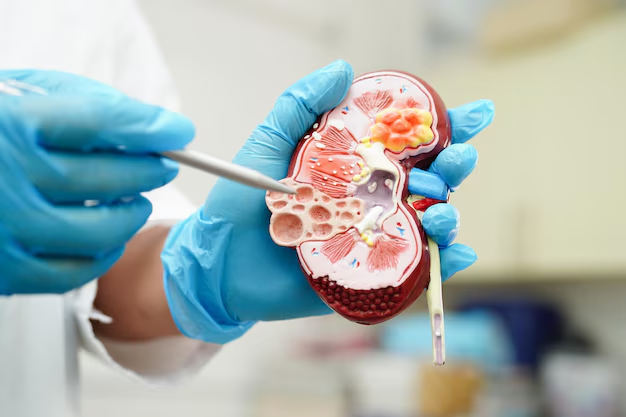What Is a Kidney Cancer?
Kidney cancer, also called renal cancer or or renal adenocarcinoma, is one of the most common types of cancer which occurs when the malignant cancer cells develop in the kidney. It usually affects adults over 60s or 70s and rarely under 50. When the kidney cancer detected in early stages there is a huge possibility of recovery. Usually it doesn’t causes any symptoms signs or symptoms in the early stages. Signs and symptoms may appear as the tumor grows.
Any of the below indicated symptoms can be signs of kidney cancer, if you have any of the following it’s important to get your symptoms checked out with your doctor.
- Blood in the pee.
- A lump or swelling in the abdomen or side.
- A persistent pain in the side.

The renal cancer can spread to other parts of the body through the blood vessels. Spread cancerous cells may be attached to the nearby or distant organs. Treatment options for kidney cancer depends on the stage of the cancer and general health status of the patient. The stage is determined by the size of the tumor and whether it has spread to other parts of the body such as lymph nodes or other organs.

SURGERY FOR KIDNEY CANCER
Surgery to remove part or all of the diseased kidney is the primary treatment option for patients who are diagnosed with renal cancer. If the cancer has not spread outside the kidney, the surgery may be the only treatment needed.The type of the surgery will be determined by the surgeon depending on the type of kidney cancer, the stage and grade and general health status of the patient. Surgery involves with removing the remove a part (partial nephrectomy) or entire affected kidney (radical nephrectomy) and nearby enlarged lymph nodes.
There are two common types of surgery for kidney cancer:
Radical Nephrectomy (Removal of the whole kidney)
Radical nephrectomy is the surgically removal of the whole cancerous kidney, adrenal gland that sits on top of the kidney, nearby lymph nodes and surrounding fatty tissue. This is the most common operation for large renal tumours.
Partial Nephrectomy (Removal of a part of the kidney)
Partial nephrectomy also called kidney-sparing surgery is the surgically removal of the diseased part of the kidney and sparing healthy kidney tissue. Removing only a part of the kidney enables to preserve the kidney function. This is the most common operation for small renal tumours.
Minimally invasive Surgical options such as Laparoscopic Nephrectomy and Robotic Nephrectomy Surgery are available for our patients.
Our pool of highly trained general surgeons committed to providing excellent surgical services to our patients. During the consultation to determine the most appropriate surgical options for the patients individual situation, our surgeon will provide detailed information about the planned operation and post-operative care and the recovery process
Robotic Nephrectomy Surgery
Robotic nephrectomy is a type of minimally invasive surgery which uses a state-of-the-art robotic system, called the DaVinci Surgical System to remove the a part or whole of the kidney. DaVinci robot provides 3-dimensional vision during the surgery and allows surgeons to operate with its robotic arms through small ports.
Compared with open surgery, da Vinci robotic nephrectomy procedure offers many benefits over open surgery, including;
- Short hospital stay
- Reduced pain and discomfort
- Faster recovery time
- Smaller incisions,
- Less blood loss and transfusions
- Minimal scarring


Laparoscopic Nephrectomy
This is a common minimally invasive surgery. It involves a few key hole incisions in order to remove the entire or a part of the kidney. Laparoscopic surgery eliminates the need for large incision. So, the procedure offers to patient’s less pain and scarring, shorter recovery time , and less risk of infection.
Surgeons in our exclusive network are among the Turkey’s most successful providers of renal cancer surgeries. Specializing in renal surgery our highly-experienced surgeons perform a wide variety of surgeries from minor procedures to extremely complicated surgeries that require extensive inpatient management and treatments.
TARGETED THERAPY AND IMMUNOTHERPAY FOR KIDNEY CANCER
While the chemotherapy is not very effective for the kidney cancer targeted drugs are the main treatment for advanced kidney cancer. Targeted drugs work in a different way than standard chemotherapy drugs. targeted therapy targets specific molecules within cells to stop the growing of the cancerous cell.
RADIOTHERAPY FOR KIDNEY CANCER
Unfortunately kidney cancer cells are not sensitive to radiation. Therefore radiotherapy is not often used to cure the kidney cancer. It is usually used for patients who can not undergone the surgery. The treatment is providing with a machine called linear accelerator. It is delivered once in a day and five days in a week (Monday through Friday) for three to six weeks. Each session will take only a few minutes. Stereotactic body radiation therapy (SBRT) can be successful for controlling symptoms and slowing the growth of the cancer that has spread to brain from kidney.
CHEMOTHERAPY FOR KIDNEY CANCER
Unfortunately, chemotherapy drugs are not very effective for kidney cancer cells they are usually usually resistant to chemotherapy drugs. Therefore chemo isn’t a standard treatment for kidney cancer. Chemotherapy can be used for cancerous cells that have spread to other parts of the body after targeted therapy and immunotherapy are ineffective fort he patient.






